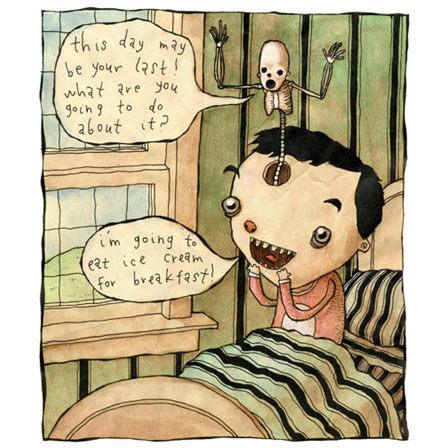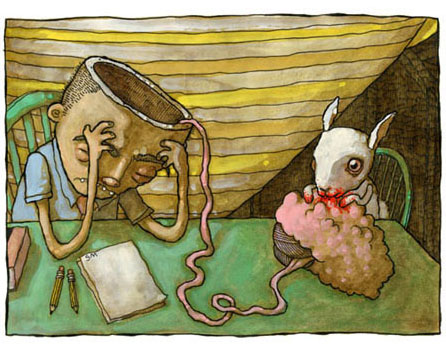Actor’s Dramaturgy
The developed actor’s dramaturgy is different in nature from that of the script. Words are meant to be spoke, spat, sung, and danced in theatre, not written and read. Yet the written/read text, the play, has evolved into the author(ity), the alpha and omega, of most theatre produced in this country.
Whenever I dwell for any length of time exclusively in the physical study of performance, a strange third eye opens. The body returns to its ritual self, the core of theatre, dance, and song.
From this place of physical intuition it’s easy to see how wholly divorced the typical play is from the rich uniqueness of the actor’s dramaturgy. Playwrights most often write for the generic actor. Yet the actor’s dramaturgy is specific to the ensemble right down to the physical identity and capabilities of the individual performer.
The standard Norteamericano script today is a theory for theatre production essentially unchanged from the one Chekhov/Stanislavsky explored over a century ago. Stanislavsky’s system, and its inheritor, the Method, has narrowly defined and set parameters around actor’s training in the United States. The Method is uniquely suited to the psychological realism and behaviorisms perfected and exploited in film acting. The subtleties of the Method find far better expression on film than on stage. Yet playwrights most often are still creating work geared toward this very limited school of actor’s training and dramaturgy.
If actors were trained differently… If playwrights challenged actors with strange new worlds…
This is in most ways the chicken or the egg conundrum. Scott at Theatre Ideas highlights a quote by professor Sonja Kuftinec referencing a study revealing what might be lacking in theatre training at the university:
collaboration, ensemble-building, idea development, interdisciplinary approaches to creating art, listening, conflict resolution, community engagement, and application of artistic skills in a wide range of settings.
There is little or no emphasis in the classroom placed on collaboration, ensemble-building, or alternative careers in the field of theatre. Conventional production training tends to recycle a system that emphasizes the passivity of the individual actor rather than graduating students who can think critically and creatively about the value of theatre in society and who act upon those thoughts.
If the occassion for writing, acting, and directing a play was attached to some of the values and skills cited here, both the theatre artist’s role and American theatre itself would begin transforming dramatically.
The current cause celebre initiated by Richard Nelson against the “developmental culture in theatre†will not last much longer than his tenure as playwriting head at Yale. (Yale School of Drama is soliciting resumes to replace him now.) With Yale no longer providing the bully pulpit for change, this process will continue intact and unabated.
Nelson’s rant and cause was always a red herring; the institutionalization of this process begins at a level much deeper than the culture surrounding American regional theatre. The whole of the education and training for theatre “professionals” is involved in what in business would be called a pyramid scheme.
“Professional” playwrights most often earn their bread-and-butter working as teachers in drama departments around the country. So they have as much invested in the status quo of this institutionalized process of play development as anyone else. I put the word “professional” in quotes because there is only a handful of writers actually making a living in theatre but there are thousands of playwrights in schools and elsewhere teaching others how to write a “good play.†These teacher playwrights, including Richard Nelson, are serving effectively as salaried dramaturgs for their student playwrights. So if there is truly a need to scapegoat the “institutional dramaturg†for the ills of theatre culture, here would be the place to begin.
The artform needs less “good plays” and more great theatre for its revitalization. Of course there are many worthy theatre teachers (playwrights, directors, actors, dramaturgs) struggling within the various institutions in the pursuit of this goal but it is realistic not cynical to realize that change will be slow within this domain, if it occurs at all.
Theatre needs to be dramaturgically driven; that is, we need to question the why and wherefore every occassion we practice it. This will not happen in the institution or the “profession” where the roles we play are clearly defined, where turf and property rights are defended tooth and nail in a scarcity model where everyone is constantly auditioning at the lotto of celebrity and career. Why I find theatre so exciting as a producer, writer, director, performer, dramaturg is that the frontier of the artform is always easily accessible to me and my ad hoc wild tribe. And we don’t need no stinking badges to practice our game.
We recognize no borders. Rehearsing our life as the nomads we are; we ride the wind as a seed that will plant itself in the crack of the sidewalk. Theatre is the weed, the flower of this temporary root.


4 thoughts on “Actor’s Dramaturgy”
Welcome back, Nick! Did you have a nice trip?
I’m taken by the idea of “salaried dramaturg for student playwrights.” I’ve occasionally wondered what approach I would take if I were ever called upon to teach playwriting, and I’m always stumped. I mean, you basically learn how to write good plays by failing in front of audiences and then thinking about why you failed. Nothing else really sticks.
Nick, I know I owe you a response, and I’ll get to it this week.
N, great to have you back and speaking truth to ether. makes me wonder just how many more theater grad’s we need each june – we really have some supply and demand issues. hope you’re gonna write some about your recent experiences. -R
Hey Nick,
Interesting thoughts! I’d just like to clarify quickly that although there’s plenty of complaints about the institutional dramaturg in my post (and in the comments), what I was trying to look at was the *relationship* between dramaturgs and playwrights and some of the ways that it breaks down. If I’m going to scapegoat anyone, it’s probably artistic directors, frankly.
Amen on the pyramid scheme.
Comments are closed.